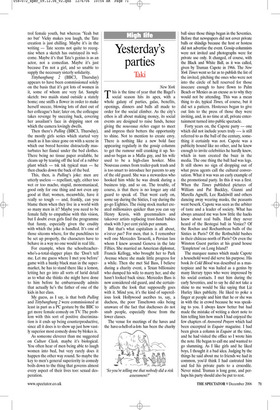Yesterday’s parties
Taki
New York
This is the time of year that the Bagel’s social season hits its apex, with a whole galaxy of parties, galas, benefits, openings, dinners and balls all made to order for the social climber. As the city’s ethos is all about making money, its social events are designed to raise funds, hence giving the nouveaux riches eager to meet and impress their betters the opportunity to shine. Not to mention to create envy. There is nothing like a new bold face appearing regularly in the gossip columns to get the rumour mill cranking it up. Soand-so began as a Mafia guy, and his wife used to be a high-class hooker. Miss Nouveau comes from trailer-park trash and is too smart to introduce her parents to any of the old guard. She was a stewardess who hooked him while he was drunk during a business trip, and so on. The trouble, of course, is that there is no longer any old guard to speak of. That went early on, some say during the Sixties, I say during the go-go Eighties. The rising stock market created millionaires quicker than you can say Henry Kravis, with greenmailers and takeover artists replacing trust-fund babies stuck with 3 per cent yields per annum.
But that’s what capitalism is all about, n’est-ce pas? For men, that is. I remember well one Mercedes Tavacoli, a Persian lass whom I knew around Geneva in the late Fifties. She married an American diplomat, Francis Kellogg, who brought her to Park Avenue where she made little progress for a while. Then she met Sid Bass, I believe during a charity event, a Texan billionaire who dumped his wife to marry her, and she hasn’t looked back since. Mercedes Bass is now considered old guard, and she certainly affects the look that supposedly goes with it. Mind you, it’s the kind of supercilious look Hollywood ascribes to, say, a duchess, the poor Tinseltown oiks being unaware of the fact that duchesses do not snub people, especially those from the lower classes.
The venue for meetings of the haves and the have-a-hell-of-a-lots has been the charity ball since those things began in the Seventies. Before that newspapers did not cover private balls or shindigs because the host or hostess did not advertise the event. Gossip columnists were not invited and photographs were for private use only. It changed, of course, with the Black and White Ball, as it was called, given by Truman Capote in 1966. The New York Times went so far as to publish the list of the invited, pitching the ones who were not into the circle of hell reserved for those insecure enough to have flown to Palm Beach or Mexico as an excuse as to why they would not be attending. This was a mean thing to do, typical Times, of course, but it did set a pattern. Hostesses began to give out lists to the press of those they were inviting, and, in no time at all, private entertainment turned into public spectacle.
Forty years on, the Capote party — one which did not include yours truly —is still referred to as the ball of the century, something it certainly was not. Capote was a publicity hound like no other, and he knew enough to invite celebrities he hardly knew, which in turn created the buzz in the media. The one thing the ball had was legs. It still shows no sign of dropping out of what press agents call the cultural conversation. What it was was an early example of the promotional party. In this it was a first. When the Times published pictures of William and Pat Buckley, Gianni and Marella Agnelli, Lee Radziwill and others dancing away wearing masks, the peasants went beserk. Capote was seen as the arbiter of taste and a leader of society. What has always amazed me was how little the hacks knew about real balls. Had they never heard of the Bestegui ball in Venice? Of the Rochas and Rochambeau balls of the Sixties in Paris? Of the Rothschild bashes in their château north of Paris? Or even the Winston Guest parties at his grand house ‘Templeton’ on Long Island?
The marquee names which made Capote a household word did serve his purpose. His book In Cold Blood was described as a masterpiece and he was hailed as a genius by many literary types who were impressed by his social contacts. I met him during the early Seventies, and to say he did not take a shine to me would be like saying that Liz Hurley likes publicity. He liked to poke a finger at people and hint that he or she was in with the in crowd because he was speaking to you. I always knew better but had made the mistake of writing a short note to him telling him how much I had enjoyed the few chapters of Answered Prayers which had been excerpted in Esquire magazine. I had been given a column in Esquire at the time, and he had visited the office so I wrote him the note. He began to call me and wanted to go slumming. As I like girls and he liked boys, I thought it a bad idea. Judging by the things he said about me to friends we had in common, you’d think I had castrated him and fed his private parts to a crocodile. Never mind. Truman is long gone, and perhaps his party should also be put to rest.


























































































 Previous page
Previous page